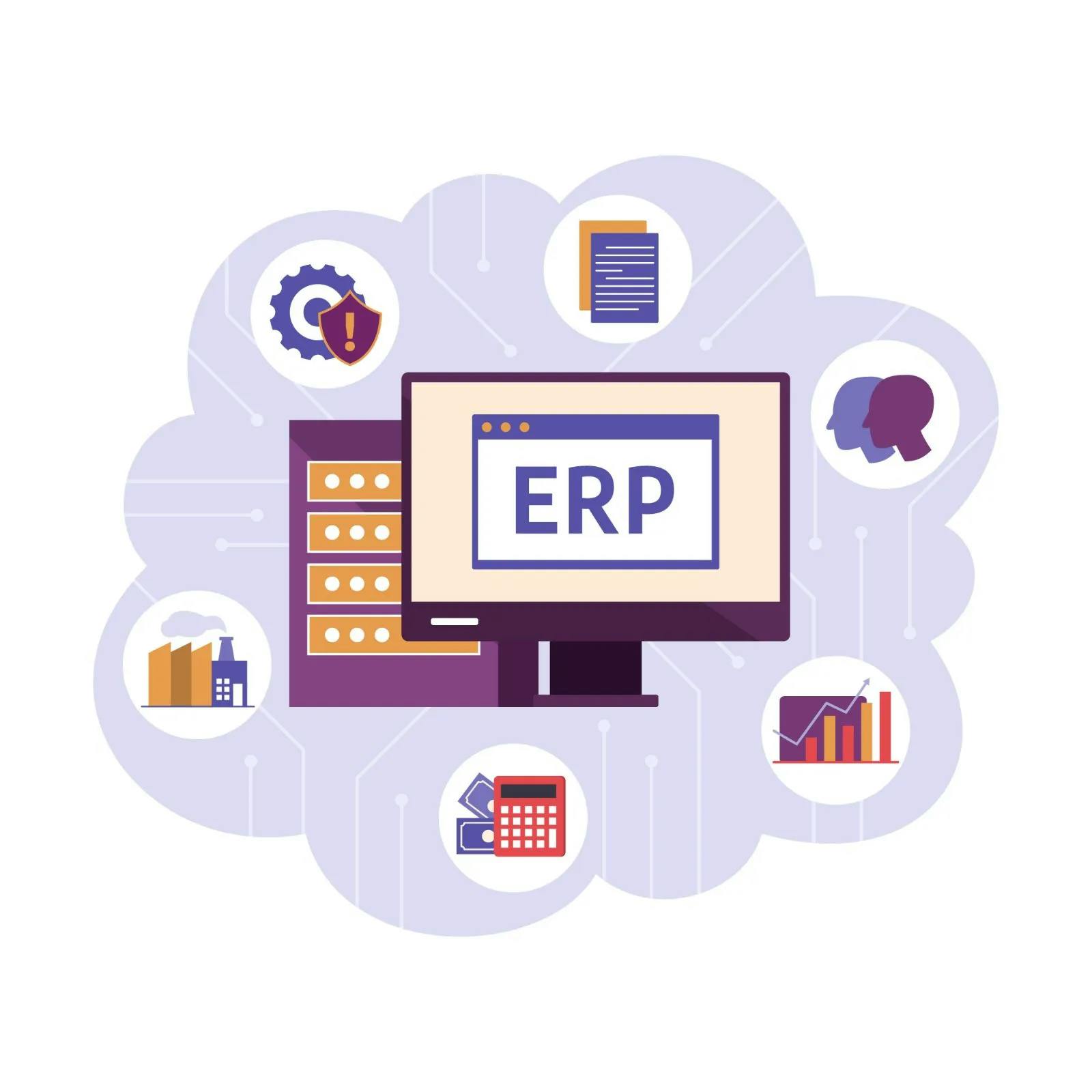ERP Systems for Small Businesses - Key Features & Benefits

Enterprise Resource Planning (ERP) systems have become a popular choice for small businesses looking to streamline their operations and improve their bottom line. These systems provide a comprehensive, integrated view of all aspects of a business, including financial management, supply chain management, and customer relationship management. In this article, we will explore the key features and benefits of ERP systems for small businesses, and how they can help small businesses to improve their efficiency, increase their competitiveness, and drive growth.
What is ERP System?
An ERP system is a fully unified software solution, either on-premise or cloud-based, that assists organisations in managing their essential functions such as accounting, inventory management, order fulfilment, and supply chain management. Moreover, it compiles data from a business into a single database, making it simpler for management to obtain the information they require to make wise decisions. A business's financial, logistical, and production components are all tracked by an ERP system in order to increase efficiency.
ERP systems and software provide several capabilities for large, medium-sized, and small organisations, as well as industry-specific adaptations. It's crucial to pick an ERP system that caters to the particular requirements of your company.
Enterprise resource planning Systems depend on build and functionalities. It concentrates on the market and its characteristics.
The key features include:
- Data integration
Data from many organisational departments and functions, such as finance, production, and sales, are combined by an ERP system. This makes it possible for various teams and departments to access and use a centralised view of the company's data. This can help to identify inefficiencies and potential areas for improvement while also enhancing internal communication and teamwork.
- Automation of business processes
An ERP system automates many repetitive and time-consuming tasks, such as invoicing and payroll, allowing employees to focus on more strategic tasks. Automation can also help to reduce errors and improve accuracy, as well as increase efficiency and productivity.
- Real-time data access
Employees may access current information in real-time using an ERP system, giving them the knowledge they need to make wise decisions. For businesses that have to react fast to changing circumstances like variations in demand or changes in the market, this might be especially crucial.
- Cost-effectiveness
By streamlining operations, eliminating errors, and increasing effectiveness, a comprehensive financial suite can assist businesses in cutting costs. Moreover, it can assist firms in saving time and money by automating operations, eliminating human data entry, and enhancing data accuracy.
- Security
Strong security features are often included in an ERP system to safeguard sensitive data and guarantee compliance with industry standards. This may consist of functions like activity logging, data encryption, and user access controls.
- Customization
Many business planning systems are highly customizable, allowing organizations to tailor the system to their specific needs and processes. This can include customizing the user interface, adding new fields or forms, and integrating with other systems.
- Mobile Access
Several latest financial suites have mobile access, enabling users to access the system using a mobile device from any location. Employees that are regularly on the move, like salespeople or field workers, may find this to be very helpful. Mobile access can boost productivity and facilitate distant working.
Benefits of Implementing ERP system for Small businesses
Improved efficiency
An ERP system can automate many repetitive and time-consuming tasks, such as invoicing and payroll. This can help small businesses to increase productivity by reducing the time spent on manual data entry and other administrative tasks. Automation can also help to reduce errors and improve accuracy, as well as increase efficiency and productivity.
Better data management
It can provide a centralized view of the organization's data, which can be accessed and used by different teams and departments. This can help small businesses to improve communication and collaboration within the organization, as well as to identify inefficiencies and areas for improvement. By having all the data in one place, small businesses can easily track and analyze all aspects of their operations, from inventory to sales and expenses.
Better decision-making
An Enterprise resource planning system can provide real-time data and analytics, giving managers the information they need to make informed decisions about the business. This can help small businesses to respond quickly to changing conditions, such as fluctuations in demand or changes in the market, and make better decisions about how to allocate resources and grow the business.
Cost savings
From helping small businesses by reducing costs to streamlining processes, reducing errors, and improving efficiency this can help SMEs save time and money, which can be invested in other areas of the business. For instance, by automating certain tasks, small businesses can reduce labour costs and minimize the risk of costly errors.
Better inventory management
Business planning software can provide real-time information on inventory levels, helping small businesses to better manage their stock and avoid stockouts. This can help to optimize inventory levels and reduce the risk of lost sales due to out-of-stock items.
Scalability
A financial suite can grow and adapt to the changing needs of small businesses. This allows small businesses to add new users, expand to new locations, or add new modules and features as needed. This scalability enables small businesses to continue to use their ERP system as they grow and evolve, without the need for costly and disruptive upgrades or replacements.
Security
To safeguard sensitive information and guarantee compliance with industry laws, a comprehensive financial system can offer strong security measures. This can include features such as user access controls, data encryption, and activity logging. This can help small businesses protect sensitive information and comply with industry regulations, which can reduce the risk of data breaches and other security incidents.
Improved reporting and analytics
A number of reporting and analytics capabilities from an Enterprise resource planning system can aid small firms in understanding their operations and monitoring performance. This can support data-driven decision-making and boost the performance of small enterprises. Small businesses can monitor key performance indicators like sales and revenue, inventory levels, and customer behaviour and make educated decisions about how to expand their business by having access to real-time data and analytics.
Selecting the right ERP system for your business

The process of choosing ERP software must be thorough and systematic, starting with the identification of the functional needs of the company, both today and in the future.
The adoption of ERP has grown quickly. But as firms grew more and more dependent on these systems, the expenses of putting them into place skyrocketed.
The need for on-premise technology to run systems means that a server room with advanced systems is frequently necessary, which increases the amount of hardware needed. Capital expenditures are also necessary for hardware and software licences, and their worth has deteriorated over time.
An on-premise solution is still a good choice, and if you have the funds, you can benefit from limitless customization of the solution. Additionally, you have sole access to the resources and system. However, doing so can be expensive, and using ERP software in this manner is currently viewed as being out of date.
Introducing the cloud, more specifically the ERP software-as-a-service (SaaS) delivery paradigm. When ERP software is offered as a cloud service, it runs on a network of distant servers rather than in a company's server room. Several times a year, the cloud provider manages and upgrades the software, as opposed to a costly upgrade every five to ten years with an on-premises system. Access to ERP systems is now available through subscriptions thanks to the cloud. With cloud-based ERP, you pay an annual subscription to use other people's servers to run your ERP systems.
Because it reduces the demand for businesses to buy software and gear or engage more IT staff, the cloud can lower both operating expenses and capital expenses. Employees can switch their attention from managing IT to activities that bring greater value, like growth and development.
Therefore, here we are listing some useful tips for successful ERP implementation for small-to-medium businesses without losing a hefty sum of money.
- Clearly define your business requirements and objectives.
- Choose the right ERP system that fits your business needs.
- Assign a dedicated project team and provide them with proper training.
- Test the system thoroughly before deployment.
- Plan for a phased implementation, starting with a small pilot group.
- Communicate effectively with all stakeholders, including employees and management.
- Establish a change management plan to ensure a smooth transition.
- Regularly review and monitor the system's performance to ensure it meets your business needs.
- Continuously update the system and make necessary adjustments to ensure it remains aligned with your business goals.
- Have a plan for post-implementation support and maintenance.
Takeaway
An Enterprise Resource Planning system is a potent instrument that can benefit any company by streamlining its operations, enhancing communication and performance, lowering expenses, boosting efficiency, and gaining insightful data.
Moreover, an organization's maximum potential can be realised with the appropriate system in place. We can make sure that our companies are fully utilising all the benefits that these systems provide by having a thorough understanding of what an ERP system is and how it operates.
Why not utilise the full benefits of cloud ERP with GenieBooks? It’s 100% cloud-based, GSTN certified, and helps you run end-to-end business operations with control, provides lucid insights into your business and stays compliant while doing so.
FAQs
- Can ERP be used for small businesses?
Yes, Enterprise Resource Planning software can be used by small businesses. They are designed to integrate and automate various business processes, such as accounting, inventory management, and customer relationship management. This can help small businesses to streamline their operations and improve efficiency. There are also smaller, more affordable ERP solutions that are tailored specifically to the needs of small businesses, as well as cloud-based options that can be accessed on a subscription basis.
- What are the 3 common types of ERP?
The three common types of ERP based on deployment are on-premises, cloud-based, and hybrid.
On-premises systems are installed and run on the company's own servers and infrastructure.
Cloud-based systems are accessed and run through a web browser and the data is stored on remote servers.
Hybrid systems combine the features of on-premises and cloud-based, utilizing a mix of both deployment methods.
- Can I develop my own ERP?
It is technically possible to develop your own ERP system, but it would be a significant undertaking and likely require a team of experienced developers and subject matter experts. Developing your own system from scratch would involve a lot of time and resources, including designing and building all the necessary modules, integrating them with existing systems, and ensuring that the system is secure and compliant with relevant regulations.
Additionally, developing your own system involves a significant amount of testing and debugging, as well as ongoing maintenance and updates. It's also worth noting that many systems have a lot of functionalities that are specific to certain types of industries, so if you're not an expert in that field, it would be hard to develop one that meets the standards.
For most companies, it is more cost-effective and efficient to purchase and customize a pre-existing ERP system that meets their specific needs. This can save a lot of time and effort and allows companies to focus on their core business operations rather than the development of an ERP system.